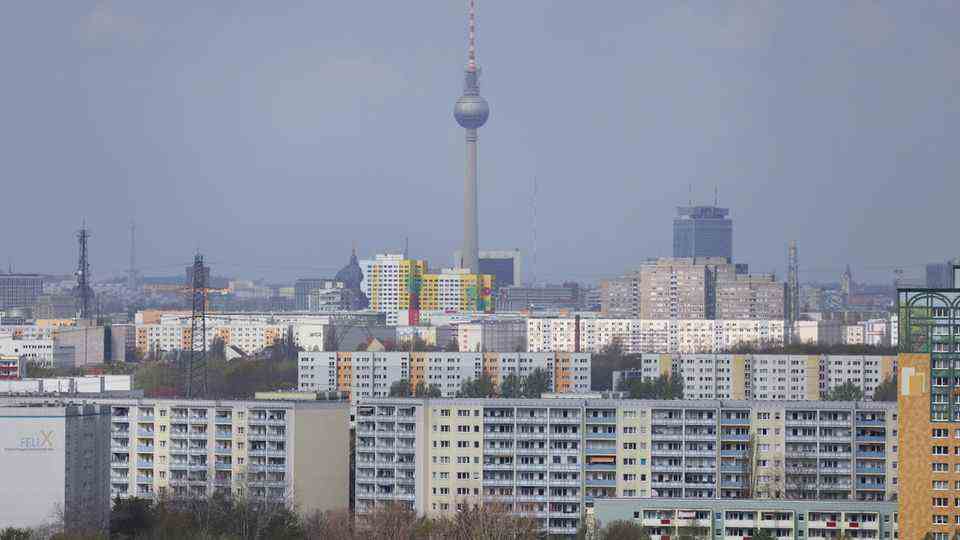analysis
Olympics 2022
How Beijing got blue skies for the Olympics
Built on a former steelworks site and surrounded by four industrial cooling towers: The Big Air Shougang ski jump in Shijingshan, a district of Beijing. The plant was closed in 2008 over concerns about air pollution.
© Jae C Hong / DPA
Top sporting performances under a bright blue sky: images like this are currently going around the world from the Winter Olympics. They would have looked very different a few years ago, when Beijing was still engulfed in smog.
For years, Beijing was notorious for its extreme air pollution. Especially in winter, the fine dust pollution was breathtaking in the truest sense of the word. Drivers often had to turn on the lights during the day, the high-rise buildings in the city of millions disappeared in the haze and residents were wearing respiratory masks long before Corona. “Airpocalypse” is what people called the unbearable smog.
Nothing of the sort can be seen at the 2022 Winter Olympics. Blue skies greet the athletes and they can even see the mountains surrounding the city. how come
How has Beijing reduced smog?
In the years leading up to the 2008 Summer Olympics in Beijing, pollution in China had increased sharply. The government responded at the time with rapid reforms that temporarily reduced pollution during the event but only slowed it down in the long term, reports the Energy Policy Institute in Chicago in a recent study. Then, in 2013, the smog climbed to record levels, becoming a source of international attention and widespread public discontent. The following year, China’s Premier Li Keqiang promised a “war on pollution.” Around the same time, Beijing was bidding to host the 2022 Winter Olympics.
At the 19th party congress in October 2017, head of state and party leader Xi Jinping then gave a speech in which he dropped the party’s previously stated growth targets in favor of sustainable development goals. What followed was the implementation of strict environmental regulations, for example for factories. “The main reason for the improvement of the air in Beijing was the political will and the rigorously implemented measures of the government,” quoted the “mirror” 2018 the head of the World Wide Fund in Beijing, Lo Szeping. “Beijing is on the way to becoming a carbon-free city”.
“Seven years later, pollution has decreased dramatically, by about 40 percent,” reports the Energy Policy Institute in reference to Li Keqiang’s 2014 speech. Beijing’s pollution is half what it was in 2008 and 2013 and in most other areas of China it has fallen to levels not seen in more than two decades.
China is building a green jungle city against the smog
7 images
“To put China’s success in perspective, these reductions account for more than three-quarters of the global decrease in pollution since 2013,” the study’s authors write. Thanks to the improvements, the average Chinese citizen can expect to live two more years if pollution reductions are maintained. Beijing residents could expect to live 3.7 and 4.6 years longer since 2008 and 2013, respectively.
Is the air in Beijing clean now?
The clear answer: no! Despite the progress, the annual average air pollution levels in the metropolis last year were still more than six times the limit set by the World Health Organization (WHO).

Watch the video: Olympia “Behind the Scenes” – reporter experiences a country in the paranoid fight against the epidemic.
And the numerous coal-burning industries still surrounding the city kept Beijing vulnerable to bad air days, explained Lauri Myllyvirta of the Center for Research on Energy and Clean Air in the Finnish capital Helsinki Finland the Associated Press (AP) news agency. When these days occur depends on factors such as car traffic or the wind that blows away the smog. Still, Chinese officials are hailing the country’s achievements, according to the AP. Last year, she said, there were 288 days of good air quality in Beijing, compared to 176 days in 2013.
How does smog affect health?
Air pollution can lead to respiratory diseases, mucous membrane irritation and irritated eyes. “You could hear people coughing everywhere,” said Myllyvirta, who lived in Beijing until 2019, describing the effects. Children, older adults, and people with health conditions like asthma are most likely to feel the effects. Particulate matter can penetrate deep into people’s lungs and has been linked to health problems such as abnormal heart rhythms and reduced lung function.
Poorer people could also be at greater risk if they can’t afford air purifiers or have to work outdoors, said Guojun He, a researcher at the University of Hong Kong and co-author of the report from the Energy Policy Institute in Chicago.
What’s next?
China has committed to becoming carbon neutral by 2060. And while the country still relies heavily on coal for power generation, He said it has made significant strides in cutting emissions and is rapidly developing green energy sources like wind and solar. The transition will take place “and it is actually already taking place,” said the scientist.
In the meantime, the government could also take short-term measures, such as temporarily closing factories. This could help ensure that the sky is also blue for major political or social events in the future.
Sources: Energy Policy Institute at the University of Chicago, Associated Press, “Mirror”



